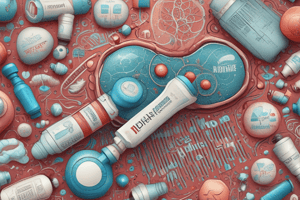Podcast
Questions and Answers
What does HGA1C reflect?
What does HGA1C reflect?
Average blood sugar levels, diabetes diagnosis & monitoring, risk of complications, and individual treatment goals.
What are common causes of hypothyroidism?
What are common causes of hypothyroidism?
- Hashimoto’s disease (correct)
- Thyroid nodules
- Grave’s disease
- Iodine deficiency (correct)
What are the common symptoms of hyperthyroidism?
What are the common symptoms of hyperthyroidism?
- Fatigue & weakness
- Cold intolerance
- Heat intolerance (correct)
- Weight gain
Primary hypothyroidism is caused when the thyroid gland is unable to produce sufficient amounts of ______.
Primary hypothyroidism is caused when the thyroid gland is unable to produce sufficient amounts of ______.
What effect does somatopause have on the body?
What effect does somatopause have on the body?
What function does amylin serve?
What function does amylin serve?
What happens to pancreatic cells with aging?
What happens to pancreatic cells with aging?
What are the incretin hormones involved in glucose homeostasis?
What are the incretin hormones involved in glucose homeostasis?
Insulin helps to promote increased ______ levels and facilitates the transport of ______.
Insulin helps to promote increased ______ levels and facilitates the transport of ______.
Flashcards are hidden until you start studying
Study Notes
Hemoglobin A1c (HbA1c)
- Reflects average blood sugar levels over 2-3 months
- Used to diagnose and monitor diabetes
- Useful for assessing risk of complications and determining treatment goals
- Normal range is 6.5%
Hypothyroidism
- Low production of T4 and T3 by the thyroid gland
- Increased TSH levels
- Causes: Hashimoto's disease, iodine deficiency, thyroid surgery, medications
- Symptoms: Fatigue, weight gain, cold intolerance, depression, dry skin, hair loss, goiter, constipation, slow heart rate, myxedema
- Diagnosis: Elevated TSH and low T3/T4 levels
- Treatment: Lifelong Synthroid (levothyroxine)
Hyperthyroidism
- Excessive production of thyroid hormones
- Low TSH and high T3/T4 levels
- Causes: Grave's disease, thyroid nodules, excessive iodine intake, medications
- Symptoms: Weight loss, increased heart rate, heat intolerance, excessive sweating, anxiety, tremors, diarrhea, sleep disturbances, hair thinning, exophthalmos, diplopia
- Diagnosis: Low TSH and elevated T3/T4 levels
- Treatment: Methimazole or PTU (PTU preferred during pregnancy), radioactive iodine therapy, thyroidectomy
Primary Hypothyroidism
- Thyroid gland is unable to produce sufficient T3 and T4
- Leads to increased TSH levels
- Causes: Hashimoto's thyroiditis, iodine deficiency, thyroid surgery, medications
- Symptoms: Cold intolerance, decreased sweating, depression/irritability, slow heart rate, weight gain, constipation, irregular and heavy periods, brittle nails, puffy face, goiter, muscle or joint pain, myxedema
Somatopause
- Age-related decline in growth hormone (GH) levels
- Begins in middle age and progresses with age
- Affects body composition, physical capabilities, and metabolism
- Increased body fat and decreased lean muscle mass
- Increased risk of type 2 diabetes due to insulin resistance
- Decreased bone health, increasing risk of osteoporosis and fractures
- Reduced energy levels and increased fatigue
Effects of Aging on Pancreas
- Impaired glucose tolerance and diabetes
- Pancreatic cells replaced with fat
- Decreased insulin secretion and insulin receptor sensitivity
- Increased insulin resistance
Amylin
- Co-secreted with insulin from beta cells in the pancreas
- Helps regulate blood sugar levels by delaying gastric emptying and suppressing glucagon after meals
- Has a satiety effect
Beta Cells
- Secrete insulin and amylin
- Insulin promotes increased blood sugar levels, facilitates potassium transport
- Amylin helps regulate blood sugar by delaying gastric emptying and suppressing glucagon
- Located in the islets of Langerhans in the pancreas
GLP-1 and Glucose-Dependent Insulinotropic Peptide (GIP)
- Incretin hormones play a crucial role in postprandial insulin secretion and glucose homeostasis
Studying That Suits You
Use AI to generate personalized quizzes and flashcards to suit your learning preferences.




